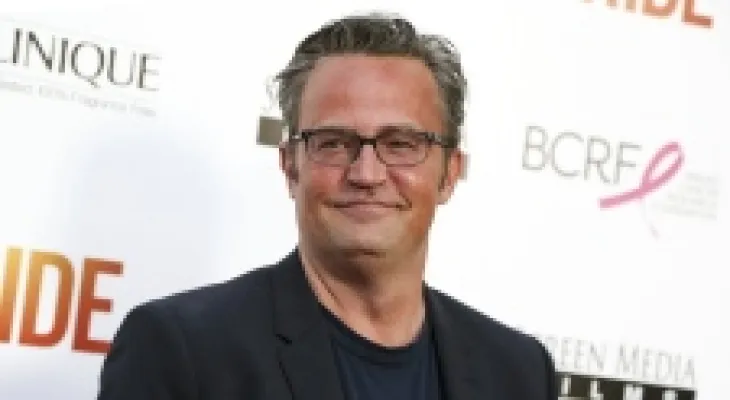Search here
Newspaper
Search here

Arab Canada News
News

Published: August 16, 2024
Five people, including his personal assistant and two doctors, have been charged in connection with the death of Matthew Perry in what prosecutors described as a "large-scale criminal network" dedicated to supplying the “Friends” star with the powerful surgical drug that killed him.
U.S. Attorney Martin Estrada said during the announcement of the charges on Thursday that the doctors exploited Perry's history of addiction in the final months of his life last year to provide him with ketamine in quantities they knew were dangerous.
Estrada said, "They knew what they were doing was wrong. They knew what they were doing put Mr. Perry at great risk. But they did it anyway."
One of the doctors even wrote in a text message, "I wonder how much this idiot will pay" and "Let's find out," according to the indictment that was unsealed on Thursday.
Perry died in October from a ketamine overdose, and prosecutors said he received several injections on the day he died from his live-in personal assistant, Kenneth Euwamassa, who later found Perry dead that day and was the first to speak with investigators.
Ketamine has dramatically increased in use in recent years as a treatment for depression, anxiety, and pain. While the drug is not approved for these conditions, doctors are free to prescribe medications for so-called off-label uses.
Authorities said Perry was regularly receiving ketamine infusion treatments for depression—at amounts that were hardly sufficient to account for his death—from his usual doctors, who were not among the accused.
When these doctors refused to give him more, he desperately sought others.
Estrada said, "We’re not talking about legitimate treatment with ketamine. We’re talking about two doctors abusing the trust they had and abusing their licenses to place someone else’s life in jeopardy."
DEA Administrator Anne Milgram said the actor paid in one instance $2,000 for a vial of ketamine that cost one of the doctors about $12. Estrada said Perry paid doctors about $55,000 in cash in the two months leading up to his death.
Estrada said two of the individuals, including one of the accused doctors, were arrested on Thursday. Two of the defendants, including Euwamassa, have already pleaded guilty to the charges, and a third person agreed to plead guilty.
Numerous messages left seeking comment from attorneys or the offices of all the defendants have not yet been returned.
Among those arrested on Thursday was Dr. Salvador Plascencia, who faced seven counts of distributing ketamine and two counts related to allegations of falsifying records after Perry's death.
Another person arrested on Thursday was Jasmin Sangha, whom prosecutors described as a known drug dealer to clients as the "Queen of Ketamine." Authorities said the ketamine that Sangha provided contributed to Perry's death.
Sangha and Plascencia are expected to appear in court for the first time later on Thursday. Prosecutors said Plascencia could face up to 120 years in prison if convicted, while Sangha could receive life in prison.
Records indicate Plascencia's medical license was in good standing and that he had no registered complaints, although it is set to expire in October.
San Diego doctor Mark Chavez agreed to plead guilty to conspiracy to distribute ketamine. Prosecutors allege Chavez smuggled ketamine to Plascencia, obtaining a portion of the drug from a wholesale distributor through a forged prescription.
The prosecutor said the defendants exchanged messages immediately after Perry's death indicating ketamine as the cause of death. Estrada said they deleted the messages and falsified medical records in an attempt to cover up their involvement.
Los Angeles police said in May that they were working with the U.S. Drug Enforcement Administration and the U.S. Postal Inspection Service in investigating how so much of the surgical drug ended up in the system of the 54-year-old man.
Euwamassa found the actor lying face down in the hot tub on October 28, and the paramedics who were called pronounced him dead at the scene.
The assistant obtained the ketamine from Eric Fleming, who pleaded guilty to acquiring the drug from Sangha and delivering it to Euwamassa. In total, Fleming delivered 50 vials of ketamine for Perry's use, including 25 vials delivered just four days before the actor's death.
Perry's autopsy report, released in December, found the level of ketamine in his blood was within the range used for general anesthesia during surgery.
However, the coroner said it had been a week and a half since he had received previous legitimate treatment, as the drug is typically metabolized within hours.
Estrada said Plascencia witnessed Perry seizing and his blood pressure rising after injecting him with the drug, yet nonetheless left several vials with Euwamassa for the actor to inject later.
The report stated the coroner listed ketamine as the primary cause of death, which was ruled an accident with no suspicion of foul play. The coroner indicated that drowning and other medical issues were contributing factors.
Perry struggled with addiction for years since his time on “Friends,” when he became one of the biggest television stars of his generation playing Chandler Bing alongside Jennifer Aniston, Courteney Cox, Lisa Kudrow, Matt LeBlanc, and David Schwimmer for 10 seasons from 1994 to 2004 in the hit NBC sitcom.
Celebrity drug-related deaths in other cases have led authorities to prosecute those who supplied them.
After rapper Mac Miller died from an overdose of cocaine, alcohol, and counterfeit oxycodone containing fentanyl, two men who supplied him with fentanyl were convicted of drug distribution. One was sentenced to more than 17 years in federal prison, while the other received a 10-year sentence.
After Michael Jackson's death in 2009 from a lethal dose of propofol, a drug intended for use during surgical procedures and not for the treatment of the insomnia the singer was suffering from, his doctor Conrad Murray was convicted of involuntary manslaughter in 2011. Murray has maintained his innocence.
Comments